译林版选择性必修三Unit 2 高考真题练(含解析)
文档属性
| 名称 | 译林版选择性必修三Unit 2 高考真题练(含解析) | 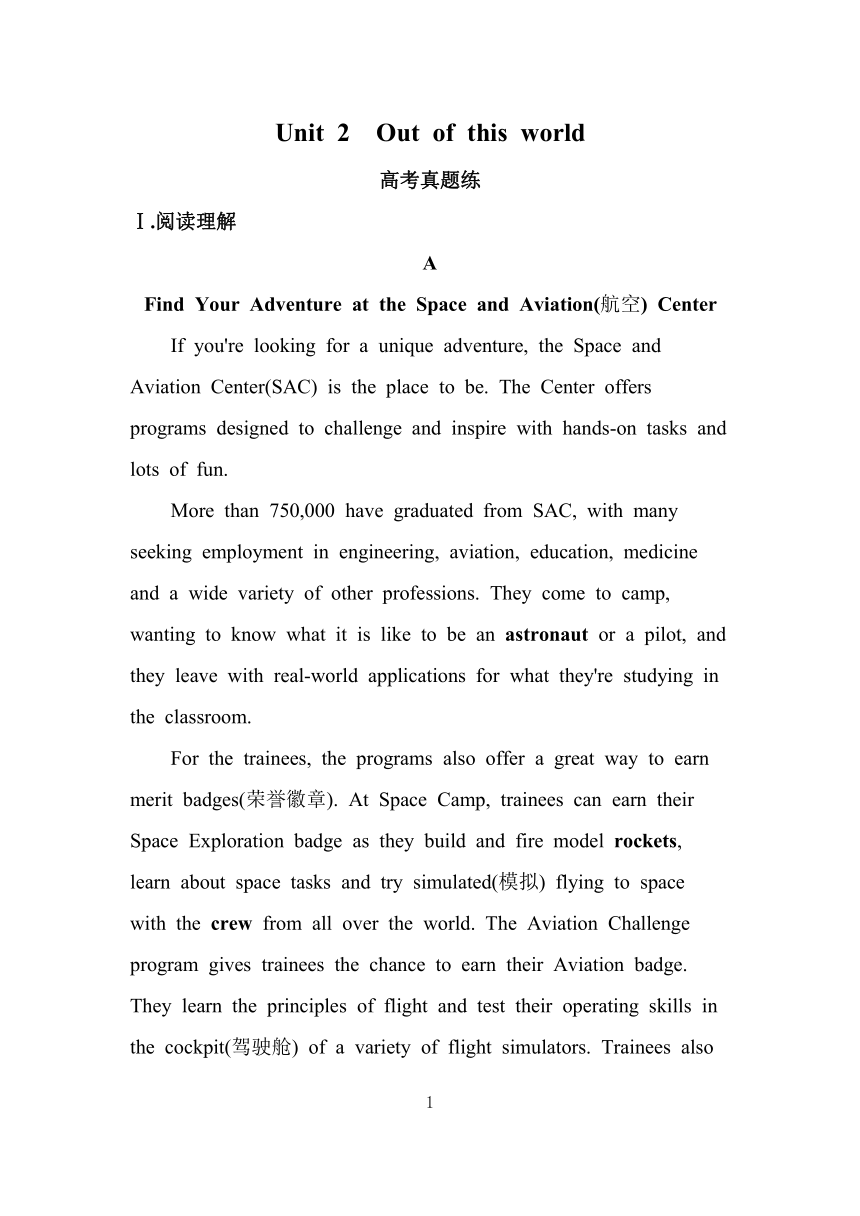 | |
| 格式 | docx | ||
| 文件大小 | 32.8KB | ||
| 资源类型 | 试卷 | ||
| 版本资源 | 牛津译林版(2019) | ||
| 科目 | 英语 | ||
| 更新时间 | 2025-07-09 18:26:38 | ||
图片预览

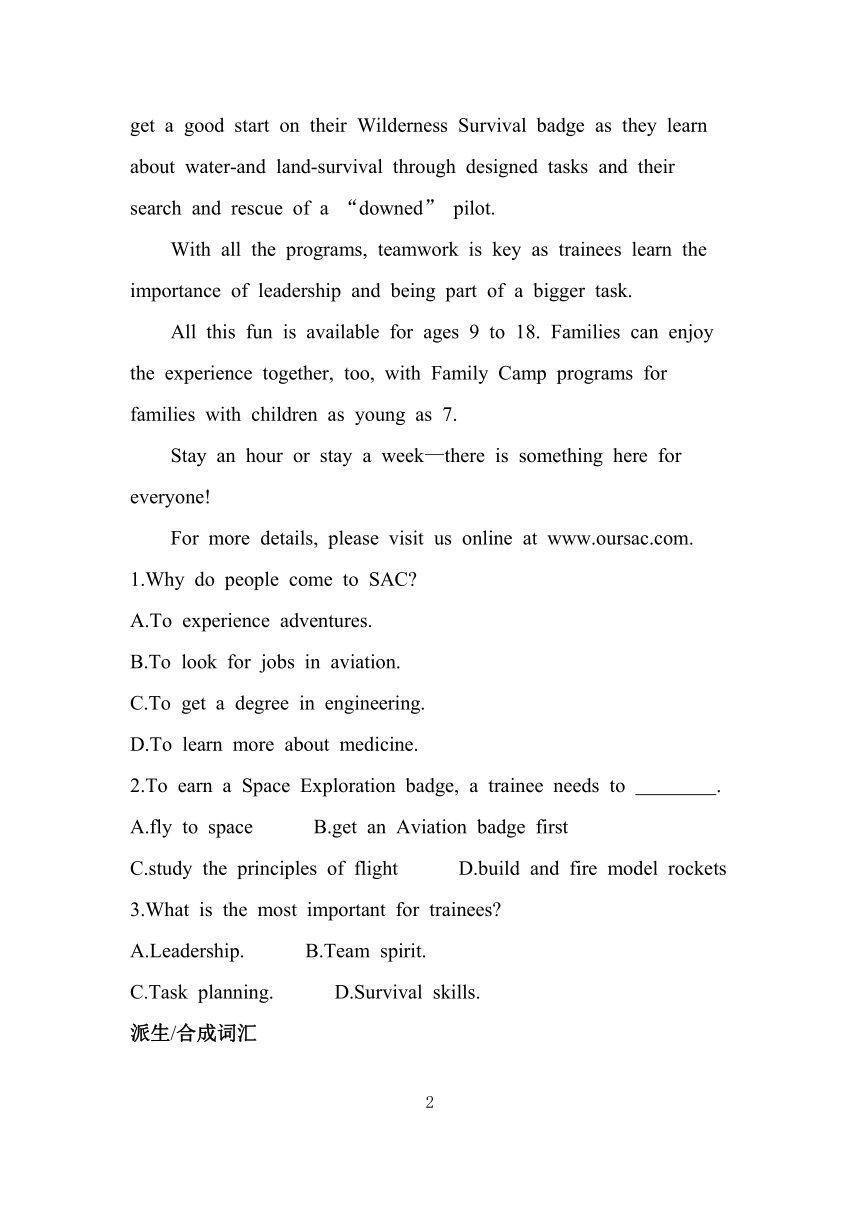
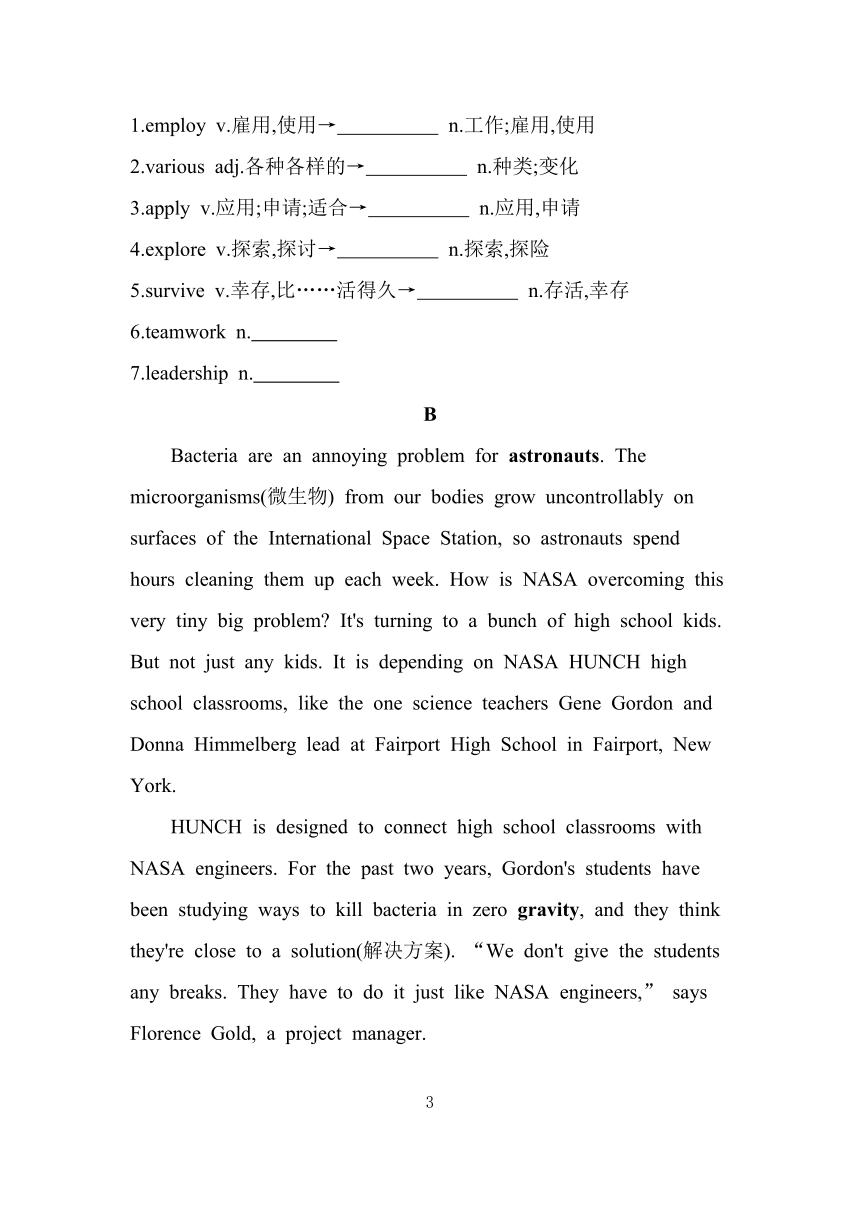
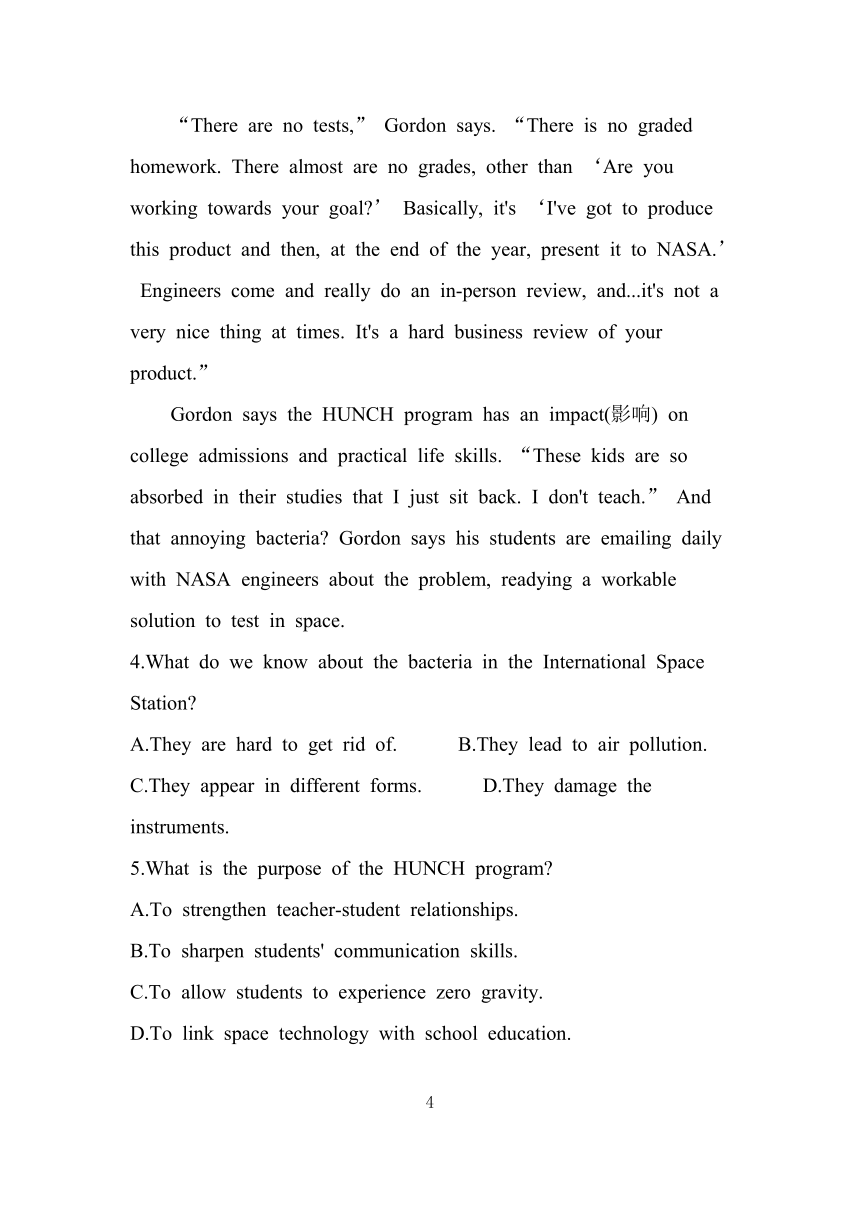
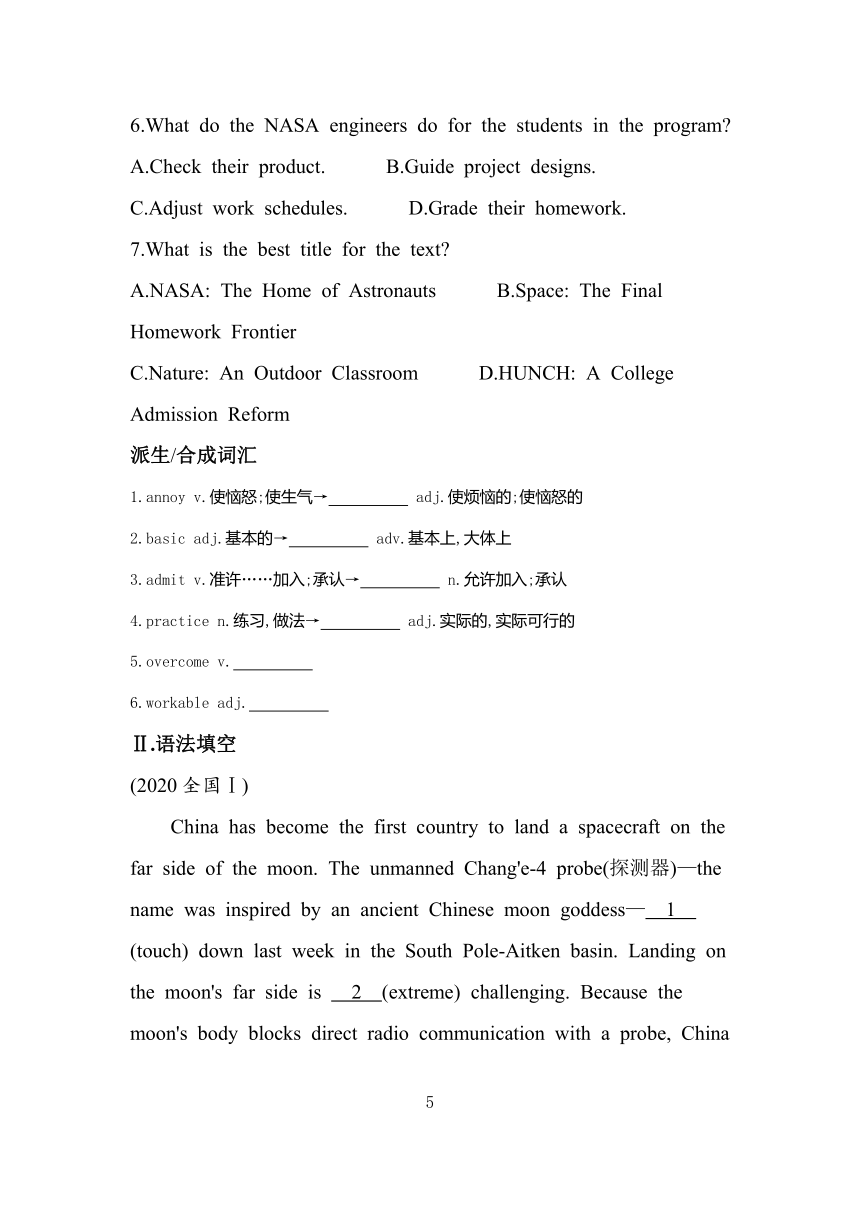
文档简介
Unit 2 Out of this world
高考真题练
Ⅰ.阅读理解
A
Find Your Adventure at the Space and Aviation(航空) Center
If you're looking for a unique adventure, the Space and Aviation Center(SAC) is the place to be. The Center offers programs designed to challenge and inspire with hands-on tasks and lots of fun.
More than 750,000 have graduated from SAC, with many seeking employment in engineering, aviation, education, medicine and a wide variety of other professions. They come to camp, wanting to know what it is like to be an astronaut or a pilot, and they leave with real-world applications for what they're studying in the classroom.
For the trainees, the programs also offer a great way to earn merit badges(荣誉徽章). At Space Camp, trainees can earn their Space Exploration badge as they build and fire model rockets, learn about space tasks and try simulated(模拟) flying to space with the crew from all over the world. The Aviation Challenge program gives trainees the chance to earn their Aviation badge. They learn the principles of flight and test their operating skills in the cockpit(驾驶舱) of a variety of flight simulators. Trainees also get a good start on their Wilderness Survival badge as they learn about water-and land-survival through designed tasks and their search and rescue of a “downed” pilot.
With all the programs, teamwork is key as trainees learn the importance of leadership and being part of a bigger task.
All this fun is available for ages 9 to 18. Families can enjoy the experience together, too, with Family Camp programs for families with children as young as 7.
Stay an hour or stay a week—there is something here for everyone!
For more details, please visit us online at www.oursac.com.
1.Why do people come to SAC
A.To experience adventures.
B.To look for jobs in aviation.
C.To get a degree in engineering.
D.To learn more about medicine.
2.To earn a Space Exploration badge, a trainee needs to .
A.fly to space B.get an Aviation badge first
C.study the principles of flight D.build and fire model rockets
3.What is the most important for trainees
A.Leadership. B.Team spirit.
C.Task planning. D.Survival skills.
派生/合成词汇
1.employ v.雇用,使用→ n.工作;雇用,使用
2.various adj.各种各样的→ n.种类;变化
3.apply v.应用;申请;适合→ n.应用,申请
4.explore v.探索,探讨→ n.探索,探险
5.survive v.幸存,比……活得久→ n.存活,幸存
6.teamwork n.
7.leadership n.
B
Bacteria are an annoying problem for astronauts. The microorganisms(微生物) from our bodies grow uncontrollably on surfaces of the International Space Station, so astronauts spend hours cleaning them up each week. How is NASA overcoming this very tiny big problem It's turning to a bunch of high school kids. But not just any kids. It is depending on NASA HUNCH high school classrooms, like the one science teachers Gene Gordon and Donna Himmelberg lead at Fairport High School in Fairport, New York.
HUNCH is designed to connect high school classrooms with NASA engineers. For the past two years, Gordon's students have been studying ways to kill bacteria in zero gravity, and they think they're close to a solution(解决方案). “We don't give the students any breaks. They have to do it just like NASA engineers,” says Florence Gold, a project manager.
“There are no tests,” Gordon says. “There is no graded homework. There almost are no grades, other than ‘Are you working towards your goal ’ Basically, it's ‘I've got to produce this product and then, at the end of the year, present it to NASA.’ Engineers come and really do an in-person review, and...it's not a very nice thing at times. It's a hard business review of your product.”
Gordon says the HUNCH program has an impact(影响) on college admissions and practical life skills. “These kids are so absorbed in their studies that I just sit back. I don't teach.” And that annoying bacteria Gordon says his students are emailing daily with NASA engineers about the problem, readying a workable solution to test in space.
4.What do we know about the bacteria in the International Space Station
A.They are hard to get rid of. B.They lead to air pollution.
C.They appear in different forms. D.They damage the instruments.
5.What is the purpose of the HUNCH program
A.To strengthen teacher-student relationships.
B.To sharpen students' communication skills.
C.To allow students to experience zero gravity.
D.To link space technology with school education.
6.What do the NASA engineers do for the students in the program
A.Check their product. B.Guide project designs.
C.Adjust work schedules. D.Grade their homework.
7.What is the best title for the text
A.NASA: The Home of Astronauts B.Space: The Final Homework Frontier
C.Nature: An Outdoor Classroom D.HUNCH: A College Admission Reform
派生/合成词汇
1.annoy v.使恼怒;使生气→ adj.使烦恼的;使恼怒的
2.basic adj.基本的→ adv.基本上,大体上
3.admit v.准许……加入;承认→ n.允许加入;承认
4.practice n.练习,做法→ adj.实际的,实际可行的
5.overcome v.
6.workable adj.
Ⅱ.语法填空
(2020全国Ⅰ)
China has become the first country to land a spacecraft on the far side of the moon. The unmanned Chang'e-4 probe(探测器)—the name was inspired by an ancient Chinese moon goddess— 1 (touch) down last week in the South Pole-Aitken basin. Landing on the moon's far side is 2 (extreme) challenging. Because the moon's body blocks direct radio communication with a probe, China first had to put a satellite in orbit above the moon in a spot 3 it could send signals to the spacecraft and to Earth. The far side of the moon is of particular 4 (interesting) to scientists because it has a lot of deep craters(环形山), more so 5 the familiar near side. Chinese researchers hope to use the instruments onboard Chang'e-4 6 (find) and study areas of the South Pole-Aitken basin. “This really excites scientists,” Carle Pieters, a scientist at Brown University, says, “because it 7 (mean) we have the chance to obtain information about how the moon 8 (construct).” Data about the moon's composition, such as how 9 ice and other treasures it contains, could help China decide whether 10 (it) plans for a future lunar(月球的)base are practical.
1. 2. 3. 4.
5. 6. 7. 8.
9. 10.
派生/合成词汇
1.challenge n.& v.挑战→ adj.具有挑战性的
2.communicate v.交流→ n.交流,交谈
3.inform v.通知→ n.信息;通知
4.compose v.构成,组成,创作→ n.成分,构成;作曲
5.spacecraft n.
6. onboard adv.
答案与分层梯度式解析
Ⅰ.A
◎语篇解读 本文是一篇应用文,介绍在航空航天中心的一些活动,在这里人们可以通过动手操作和团队合作体验冒险。
1.A 细节理解题。根据第一段第一句可知,如果你正在寻找一次独特的冒险,航空航天中心就是你的最佳去处。故选A。
2.D 细节理解题。根据第三段第二句可知,在太空营,学员在建造和发射火箭模型,了解太空任务并和来自世界各地的机组人员一起尝试太空模拟飞行时,能够赢得太空探索徽章。故选D。
3.B 细节理解题。根据第四段可知,在所有的项目中,当学员在学习领导才能的重要性和参与更大的任务时,团队合作是很关键的。故选B。
【高考词汇站】 1.employment 2.variety 3.application
4.exploration 5.survival 6.合作,协作 7.领导才能
长难句
原句 They come to camp, wanting to know what it is like to be an astronaut or a pilot, and they leave with real-world applications for what they're studying in the classroom.
分析 这是一个由and连接的并列复合句。在前一分句中,“wanting to know...a pilot”是现在分词短语作状语,what引导宾语从句,作动词know的宾语;在后一分句中,what引导宾语从句,作for的宾语。
译文 他们来到营地,想知道成为宇航员或飞行员是什么感觉,然后他们带着现实世界的应用离开,去学习他们在教室里学习的东西。
B
◎语篇解读 本文是一篇说明文。美国国家航空航天局创建了一个名为HUNCH的项目,项目主要内容为高中生研究如何杀死国际空间站的细菌。
4.A 推理判断题。根据第一段第二句可知,来自我们身体的微生物在国际空间站的表面上无法控制地生长,所以国际空间站的细菌非常难处理,宇航员每周要花几个小时清理它们。故选A。
5.D 细节理解题。根据第二段第一句可知,HUNCH的目的是将高中教室与NASA的工程师联系在一起。故选D。
6.A 推理判断题。根据第三段最后两句可知,工程师们来亲自审查,这是对产品的一次艰难的商业评论,所以NASA的工程师做的事情就是对学生做出的研究结果进行检查。故选A。
7.B 主旨大意题。本文主要介绍HUNCH项目,这个项目是有关太空研究的,而且研究者都是高中生。根据以上要点可知,最佳选项是B项(Space: The Final Homework Frontier);Space对应太空研究,Homework对应高中教育,Frontier(前沿)突出了这个项目的领先性。故选B。
易错归因 文章并非重点介绍NASA,排除A项;Nature并不聚焦太空领域,排除C项;HUNCH项目不是大学入学改革,排除D项。
【高考词汇站】 1.annoying 2.basically 3.admission
4.practical 5.克服,解决 6.可行的;行得通的
长难句
原句 For the past two years, Gordon's students have been studying ways to kill bacteria in zero gravity, and they think they're close to a solution.
分析 本句是一个并列复合句。and连接两个并列分句,在前一分句中,“to kill bacteria in zero gravity”是不定式短语作后置定语;在后一分句中,动词think后是省略引导词的宾语从句。
译文 在过去的两年里,戈登的学生们一直在研究在零重力下杀死细菌的方法,他们认为快要有解决方案了。
Ⅱ.◎语篇解读 本文为说明文。文章主要讲述了中国发射的嫦娥四号无人探测器在月球背面成功着陆的重大事件。
1.touched 考查时态。根据时间状语last week可知设空处需用一般过去时,故填touched。
2.extremely 考查副词。设空处作状语,修饰形容词challenging,需用副词形式;根据提示词可知答案为extremely。
3.where 考查定语从句。设空处引导定语从句,先行词为spot,将先行词代入定语从句后为:It could send signals to the spacecraft and to Earth in the spot.设空处作地点状语,故填where。
4.interest 考查名词。设空处作介词of的宾语,根据提示词可知设空处需填名词形式;此外“be of+抽象名词”也是固定结构,故填名词interest。
5.than 考查介词。根据设空处前的more可知设空处填介词than。
6.to find 考查非谓语动词。设空处作目的状语,主语Chinese researchers与find为逻辑上的主动关系,故填不定式的主动形式to find。
7.means 考查时态和主谓一致。根据语境及设空处后宾语从句中的谓语动词have可知设空处需用一般现在时;主语it为第三人称单数,故填means。
8.is constructed 考查时态、语态和主谓一致。主语the moon与construct为被动关系,故设空处需用被动语态;主语为the moon,谓语动词应用第三人称单数形式;根据语境可知,应用一般现在时,故填is constructed。
9.much 考查限定词。设空处后的名词ice作“冰”讲时为不可数名词,根据上下文可知设空处填much。
10.its 考查代词。设空处作名词plans的定语,故需用形容词性物主代词its。
【高考词汇站】 1.challenging 2.communication
3.information 4.composition 5.宇宙飞船,航天器
6.在飞机上,在船上,在车上
长难句
原句 Because the moon's body blocks direct radio communication with a probe, China first had to put a satellite in orbit above the moon in a spot where it could send signals to the spacecraft and to Earth.
分析 本句是一个主从复合句。其中“Because...probe”是原因状语从句;“where...Earth”是定语从句,修饰先行词spot。
译文 由于月球本身阻挡了与探测器的直接无线电通信,中国首先必须将一颗卫星送入月球上方的轨道的一个点,卫星可以在这个点向航天器和地球发送信号。
11
高考真题练
Ⅰ.阅读理解
A
Find Your Adventure at the Space and Aviation(航空) Center
If you're looking for a unique adventure, the Space and Aviation Center(SAC) is the place to be. The Center offers programs designed to challenge and inspire with hands-on tasks and lots of fun.
More than 750,000 have graduated from SAC, with many seeking employment in engineering, aviation, education, medicine and a wide variety of other professions. They come to camp, wanting to know what it is like to be an astronaut or a pilot, and they leave with real-world applications for what they're studying in the classroom.
For the trainees, the programs also offer a great way to earn merit badges(荣誉徽章). At Space Camp, trainees can earn their Space Exploration badge as they build and fire model rockets, learn about space tasks and try simulated(模拟) flying to space with the crew from all over the world. The Aviation Challenge program gives trainees the chance to earn their Aviation badge. They learn the principles of flight and test their operating skills in the cockpit(驾驶舱) of a variety of flight simulators. Trainees also get a good start on their Wilderness Survival badge as they learn about water-and land-survival through designed tasks and their search and rescue of a “downed” pilot.
With all the programs, teamwork is key as trainees learn the importance of leadership and being part of a bigger task.
All this fun is available for ages 9 to 18. Families can enjoy the experience together, too, with Family Camp programs for families with children as young as 7.
Stay an hour or stay a week—there is something here for everyone!
For more details, please visit us online at www.oursac.com.
1.Why do people come to SAC
A.To experience adventures.
B.To look for jobs in aviation.
C.To get a degree in engineering.
D.To learn more about medicine.
2.To earn a Space Exploration badge, a trainee needs to .
A.fly to space B.get an Aviation badge first
C.study the principles of flight D.build and fire model rockets
3.What is the most important for trainees
A.Leadership. B.Team spirit.
C.Task planning. D.Survival skills.
派生/合成词汇
1.employ v.雇用,使用→ n.工作;雇用,使用
2.various adj.各种各样的→ n.种类;变化
3.apply v.应用;申请;适合→ n.应用,申请
4.explore v.探索,探讨→ n.探索,探险
5.survive v.幸存,比……活得久→ n.存活,幸存
6.teamwork n.
7.leadership n.
B
Bacteria are an annoying problem for astronauts. The microorganisms(微生物) from our bodies grow uncontrollably on surfaces of the International Space Station, so astronauts spend hours cleaning them up each week. How is NASA overcoming this very tiny big problem It's turning to a bunch of high school kids. But not just any kids. It is depending on NASA HUNCH high school classrooms, like the one science teachers Gene Gordon and Donna Himmelberg lead at Fairport High School in Fairport, New York.
HUNCH is designed to connect high school classrooms with NASA engineers. For the past two years, Gordon's students have been studying ways to kill bacteria in zero gravity, and they think they're close to a solution(解决方案). “We don't give the students any breaks. They have to do it just like NASA engineers,” says Florence Gold, a project manager.
“There are no tests,” Gordon says. “There is no graded homework. There almost are no grades, other than ‘Are you working towards your goal ’ Basically, it's ‘I've got to produce this product and then, at the end of the year, present it to NASA.’ Engineers come and really do an in-person review, and...it's not a very nice thing at times. It's a hard business review of your product.”
Gordon says the HUNCH program has an impact(影响) on college admissions and practical life skills. “These kids are so absorbed in their studies that I just sit back. I don't teach.” And that annoying bacteria Gordon says his students are emailing daily with NASA engineers about the problem, readying a workable solution to test in space.
4.What do we know about the bacteria in the International Space Station
A.They are hard to get rid of. B.They lead to air pollution.
C.They appear in different forms. D.They damage the instruments.
5.What is the purpose of the HUNCH program
A.To strengthen teacher-student relationships.
B.To sharpen students' communication skills.
C.To allow students to experience zero gravity.
D.To link space technology with school education.
6.What do the NASA engineers do for the students in the program
A.Check their product. B.Guide project designs.
C.Adjust work schedules. D.Grade their homework.
7.What is the best title for the text
A.NASA: The Home of Astronauts B.Space: The Final Homework Frontier
C.Nature: An Outdoor Classroom D.HUNCH: A College Admission Reform
派生/合成词汇
1.annoy v.使恼怒;使生气→ adj.使烦恼的;使恼怒的
2.basic adj.基本的→ adv.基本上,大体上
3.admit v.准许……加入;承认→ n.允许加入;承认
4.practice n.练习,做法→ adj.实际的,实际可行的
5.overcome v.
6.workable adj.
Ⅱ.语法填空
(2020全国Ⅰ)
China has become the first country to land a spacecraft on the far side of the moon. The unmanned Chang'e-4 probe(探测器)—the name was inspired by an ancient Chinese moon goddess— 1 (touch) down last week in the South Pole-Aitken basin. Landing on the moon's far side is 2 (extreme) challenging. Because the moon's body blocks direct radio communication with a probe, China first had to put a satellite in orbit above the moon in a spot 3 it could send signals to the spacecraft and to Earth. The far side of the moon is of particular 4 (interesting) to scientists because it has a lot of deep craters(环形山), more so 5 the familiar near side. Chinese researchers hope to use the instruments onboard Chang'e-4 6 (find) and study areas of the South Pole-Aitken basin. “This really excites scientists,” Carle Pieters, a scientist at Brown University, says, “because it 7 (mean) we have the chance to obtain information about how the moon 8 (construct).” Data about the moon's composition, such as how 9 ice and other treasures it contains, could help China decide whether 10 (it) plans for a future lunar(月球的)base are practical.
1. 2. 3. 4.
5. 6. 7. 8.
9. 10.
派生/合成词汇
1.challenge n.& v.挑战→ adj.具有挑战性的
2.communicate v.交流→ n.交流,交谈
3.inform v.通知→ n.信息;通知
4.compose v.构成,组成,创作→ n.成分,构成;作曲
5.spacecraft n.
6. onboard adv.
答案与分层梯度式解析
Ⅰ.A
◎语篇解读 本文是一篇应用文,介绍在航空航天中心的一些活动,在这里人们可以通过动手操作和团队合作体验冒险。
1.A 细节理解题。根据第一段第一句可知,如果你正在寻找一次独特的冒险,航空航天中心就是你的最佳去处。故选A。
2.D 细节理解题。根据第三段第二句可知,在太空营,学员在建造和发射火箭模型,了解太空任务并和来自世界各地的机组人员一起尝试太空模拟飞行时,能够赢得太空探索徽章。故选D。
3.B 细节理解题。根据第四段可知,在所有的项目中,当学员在学习领导才能的重要性和参与更大的任务时,团队合作是很关键的。故选B。
【高考词汇站】 1.employment 2.variety 3.application
4.exploration 5.survival 6.合作,协作 7.领导才能
长难句
原句 They come to camp, wanting to know what it is like to be an astronaut or a pilot, and they leave with real-world applications for what they're studying in the classroom.
分析 这是一个由and连接的并列复合句。在前一分句中,“wanting to know...a pilot”是现在分词短语作状语,what引导宾语从句,作动词know的宾语;在后一分句中,what引导宾语从句,作for的宾语。
译文 他们来到营地,想知道成为宇航员或飞行员是什么感觉,然后他们带着现实世界的应用离开,去学习他们在教室里学习的东西。
B
◎语篇解读 本文是一篇说明文。美国国家航空航天局创建了一个名为HUNCH的项目,项目主要内容为高中生研究如何杀死国际空间站的细菌。
4.A 推理判断题。根据第一段第二句可知,来自我们身体的微生物在国际空间站的表面上无法控制地生长,所以国际空间站的细菌非常难处理,宇航员每周要花几个小时清理它们。故选A。
5.D 细节理解题。根据第二段第一句可知,HUNCH的目的是将高中教室与NASA的工程师联系在一起。故选D。
6.A 推理判断题。根据第三段最后两句可知,工程师们来亲自审查,这是对产品的一次艰难的商业评论,所以NASA的工程师做的事情就是对学生做出的研究结果进行检查。故选A。
7.B 主旨大意题。本文主要介绍HUNCH项目,这个项目是有关太空研究的,而且研究者都是高中生。根据以上要点可知,最佳选项是B项(Space: The Final Homework Frontier);Space对应太空研究,Homework对应高中教育,Frontier(前沿)突出了这个项目的领先性。故选B。
易错归因 文章并非重点介绍NASA,排除A项;Nature并不聚焦太空领域,排除C项;HUNCH项目不是大学入学改革,排除D项。
【高考词汇站】 1.annoying 2.basically 3.admission
4.practical 5.克服,解决 6.可行的;行得通的
长难句
原句 For the past two years, Gordon's students have been studying ways to kill bacteria in zero gravity, and they think they're close to a solution.
分析 本句是一个并列复合句。and连接两个并列分句,在前一分句中,“to kill bacteria in zero gravity”是不定式短语作后置定语;在后一分句中,动词think后是省略引导词的宾语从句。
译文 在过去的两年里,戈登的学生们一直在研究在零重力下杀死细菌的方法,他们认为快要有解决方案了。
Ⅱ.◎语篇解读 本文为说明文。文章主要讲述了中国发射的嫦娥四号无人探测器在月球背面成功着陆的重大事件。
1.touched 考查时态。根据时间状语last week可知设空处需用一般过去时,故填touched。
2.extremely 考查副词。设空处作状语,修饰形容词challenging,需用副词形式;根据提示词可知答案为extremely。
3.where 考查定语从句。设空处引导定语从句,先行词为spot,将先行词代入定语从句后为:It could send signals to the spacecraft and to Earth in the spot.设空处作地点状语,故填where。
4.interest 考查名词。设空处作介词of的宾语,根据提示词可知设空处需填名词形式;此外“be of+抽象名词”也是固定结构,故填名词interest。
5.than 考查介词。根据设空处前的more可知设空处填介词than。
6.to find 考查非谓语动词。设空处作目的状语,主语Chinese researchers与find为逻辑上的主动关系,故填不定式的主动形式to find。
7.means 考查时态和主谓一致。根据语境及设空处后宾语从句中的谓语动词have可知设空处需用一般现在时;主语it为第三人称单数,故填means。
8.is constructed 考查时态、语态和主谓一致。主语the moon与construct为被动关系,故设空处需用被动语态;主语为the moon,谓语动词应用第三人称单数形式;根据语境可知,应用一般现在时,故填is constructed。
9.much 考查限定词。设空处后的名词ice作“冰”讲时为不可数名词,根据上下文可知设空处填much。
10.its 考查代词。设空处作名词plans的定语,故需用形容词性物主代词its。
【高考词汇站】 1.challenging 2.communication
3.information 4.composition 5.宇宙飞船,航天器
6.在飞机上,在船上,在车上
长难句
原句 Because the moon's body blocks direct radio communication with a probe, China first had to put a satellite in orbit above the moon in a spot where it could send signals to the spacecraft and to Earth.
分析 本句是一个主从复合句。其中“Because...probe”是原因状语从句;“where...Earth”是定语从句,修饰先行词spot。
译文 由于月球本身阻挡了与探测器的直接无线电通信,中国首先必须将一颗卫星送入月球上方的轨道的一个点,卫星可以在这个点向航天器和地球发送信号。
11
同课章节目录
